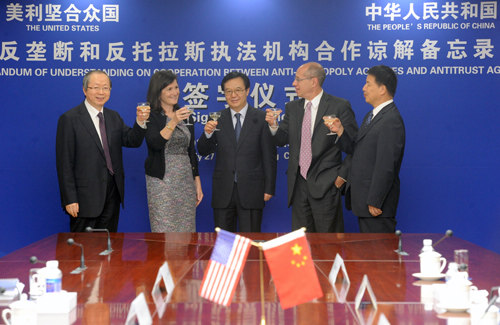|
 |
|
CHEERS TO ANTI-TRUST COOPERATION: (From left to right) Peng Sen, Vice Chairman of the NDRC, Christine Varney, Assistant Attorney General of the Department of Justice's Antitrust Division, Gao Hucheng, Vice Minister of Commerce, Jon Leibowitz, Chairman of the FTC and Zhong Youping, Vice Minister of SAIC toast the signing of a memorandum of understanding regarding cooperation in anti-trust and anti-monopoly investigations in Beijing on July 27 (CFP) |
China and the United States signed a memorandum of understanding regarding cooperation in anti-trust and anti-monopoly investigations in Beijing on July 27. China's National Development and Reform Commission (NDRC), Ministry of Commerce (MOFCOM) and State Administration for Industry and Commerce (SAIC) signed the document with the U.S. Department of Justice and Federal Trade Commission (FTC).
The document is a long-term framework that will allow law enforcement agencies in both countries to coordinate in investigating anti-trust cases through information exchanges, training programs and workshops, and providing comments on rulemaking, according to the memorandum.
The document will have a profound influence on future exchanges and cooperation between the two countries looking to improve relevant policies, curb anti-competition practices, safeguard consumers' rights and interests, and boost economic growth, said Zhong Youping, Vice Minister of SAIC.
"China is America's largest trading partner and we signed the memorandum with China shortly after it enacted its Anti-Monopoly Law," said FTC Chairman Jon Leibowitz.
Coordination and disputes
China enacted the Anti-Monopoly Law on August 1, 2008, but didn't introduce supporting laws and rules until 2009. Anti-trust legislation has been around for about a century in the United States, with its first anti-trust law enacted in 1890 with the Sherman Antitrust Act.
The U.S. FTC and Department of Justice have offered constructive suggestions for SAIC to adapt to international anti-monopoly standards while drafting the Anti-Monopoly Law and supporting rules, and sent experts to lecture the SAIC officials on related subjects, said Zhong.
Both sides also sent delegations to carry out exchange visits and communicate over a wide range of topics.
China's Anti-Monopoly Law targets the global market like its U.S. counterpart law.
MOFCOM announced conditional approval for the merger between Russian potash fertilizer producers Silvinit and Uralkali in June 2011, requiring Uralkali to continue to supply China with potash fertilizer.
In 2009, MOFCOM required Pfizer to hand off its China operation of swine mycoplasmal pneumonia vaccine to an independent third party purchaser before it completed its $68-billion acquisition of Wyeth.
General Motors was required to procure parts from multiple sources on a non-discriminatory basis and not impose unreasonable conditions that may favor Delphi over its competitors as a condition for General Motors' acquisition of auto parts manufacturer Delphi.
MOFCOM also blocked Coca-Cola's bid to buy China's top juice maker, Huiyuan, that year.
Currently, MOFCOM is investigating several anti-monopoly cases, including Yum Brands, Inc.'s application to acquire catering business Little Sheep Group Ltd. and Nestle's proposed deal to buy a 60-percent stake in candy maker Hsu Fu Chi International.
By the end of May 2011, China's anti-monopoly agencies had handled more than 140 cases, of which one was blocked, seven won conditional approval and the rest were approved. A majority of these acquisitions involved only Chinese companies, including mergers and acquisitions between large state-owned enterprises.
| 